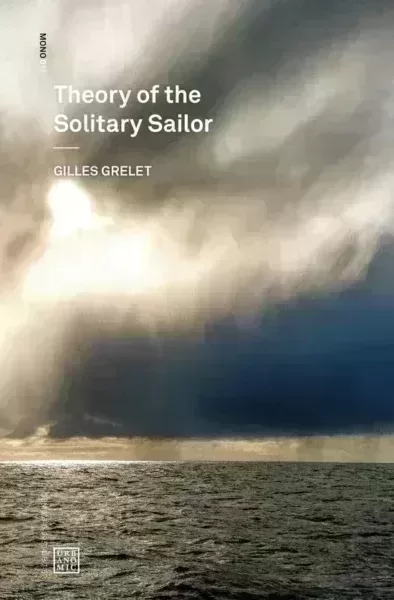
Theory of the Solitary Sailor
Gilles Grelet
translated by Amy Ireland and Robin Mackay (Urbanonomic, 2022)
On the mind at sea
We had a neighbour in Cornwall who had retired years earlier from the Merchant Navy. On rainy afternoons I would often go to Claude’s house; he and his wife Lillian had Indonesian nutcracker figures and plates on walls depicting warm bays and mountains that were exotic to my ten-yearold self. I wanted to see their budgie and perhaps hear it talking. The bird, too, felt like a piece of exotica — a living souvenir from some far-off latitude, like the murderous orangutan in Edgar Allan Poe’s story, brought by a sailor to Paris from Borneo — even if it had only come from the local pet shop. The bird seldom performed on cue so Claude, who was around eighty at the time, performed instead. He filled the silence with stories of his journeys overseas. He talked about hard sailing at night in the mouth of the Bristol channel and losing a man overboard. There was no stopping, he said. To turn the wheel in that much wind would have dis-masted the ship. In the time taken to reduce sail and come about, they’d have travelled miles from the drowning man. Nobody finds a body at night in a gale anyway. There was a tide to be made and so they sailed on with the sheets hard as metal bars and the wake of the ship a ruthless, disintegrating line.
Ireland, Wales, the west of England, and Brittany are all part of Europe’s North Atlantic coast. Unlike Spain and Portugal, their most immediate body of water isn’t yet the Atlantic Ocean but rather the Celtic Sea. This is the relatively shallow body of water over the extended continental shelf of Europe — that is, the now-underwater ledge that extends into the Atlantic before dropping away to proper pelagic depths. The continental shelf has risen and fallen within the span of human history; in some places, at low tide and in clear conditions, the traces of dwellings are visible underwater. Only nine thousand years ago Great Britain was connected to what is now mainland Europe. The entranceways to the European and British ports that now separate these landmasses are a busy zone of traffic and transit, shipping and fishing. Sailors have traced countless lines through these shallow waters, with their strong tidal currents, fringed with rocks above and below the surface.
The twin skills of marine traffic are to find and to avoid. The need to travel safely through complex waterways such as these has spurred the development of modern navigation. In England in the early sixteenth century, Trinity House was established by Royal Charter to facilitate navigation for shipping. (Other European naval powers set up comparable bodies, for instance Portugal’s even earlier Escola de Sagres.) In 1707, the loss of four warships of the Royal Navy and thirteen hundred lives among the western rocks of the Isles of Scilly, an archipelago of islands and skerries west of Cornwall, focussed minds in Parliament on the need to improve the infrastructure of shipping, leading to the 1714 Longitude Act, which instituted a campaign to find more reliable means of establishing location at sea.
This article is behind the paywall. Want to keep reading this article?
Subscribe to the European Review of Books, from as low as €4,16 per month.
Already a subscriber? Sign in
- Edward J. Gillin, An Empire of Magnetism: Global Science and the British Magnetic Enterprise in the Age of Imperialism (Oxford University Press, 2023). ↩︎
- Wilkie Collins, Rambles Beyond Railways, or, Notes in Cornwall Taken a-Foot (London: Richard Bentley, 1852), 212. ↩︎
- Christina Elizabeth Sharpe, In the Wake: On Blackness and Being (Duke University Press, 2016). ↩︎
- François Laruelle, « The Generic as Predicate and Constant: Non-Philosophy and Materialism », translated by Taylor Adkins, in The Speculative Turn: Continental Materialism and Realism, edited by Levi Bryant, Nick Srnicek and Graham Harman (Melbourne: re.press, 2011), 251. ↩︎
- Ray Brassier, « Axiomatic Heresy: The Non-Philosophy of François Laruelle », Radical Philosophy no. 121 (2003), <a href=”https://www.radicalphilosophy.com/article/axiomatic-heresy” rel=”noopener noreferrer”>https://www.radicalphilosophy.com/article/axiomatic-heresy</a>; Ekin Erkan, « Book Review: A Biography of Ordinary Man: On Authorities and Minorities », Cincinnati Romance Review no. 46 (Spring 2019): 119—23. ↩︎
- He continues with a Breton citation inserted in the footnote: « For ‘the stone accepts the encirclement of silence [tegemer ar maen kelc’hiadur an didrouz]’ (M.-J. Christien, <em>Pierre après pierre</em>, translated into Breton by C. Sauvaget [Quimperlé: Les Chemins Bleus, 2008], 18) ». ↩︎
- Joshua Slocum, The Voyages of Joshua Slocum, ed. Walter Magnes Teller, 3rd printing (New Jersey: Rutgers University Press, 1958), 238. ↩︎
- Poems and translations from Early-Medieval-England.net (http://www.anglo-saxons.net) ↩︎
- The western coasts have long been recognised as near-pristine coastal sites. Early monitoring stations were set up on Valentia and the Iveragh Peninsula in the southwest of County Kerry in the late nineteenth century, making those locations a baseline for water purity when the effects of industrial shipping was already obvious. Kevin Camidge et al., « The Lyonesse Project: A Study of the Coastal and Marine Environment of the Isles of Scilly » (Archaeology Data Service, 2014). ↩︎
- Richard Larn, Shipwrecks of the Isles of Scilly, 2nd revised edition (Nairn: Thomas & Lochar, 1994), 19. ↩︎